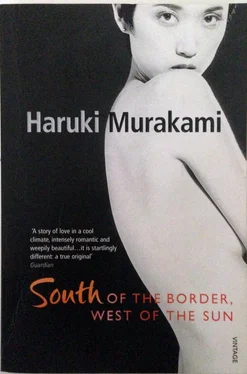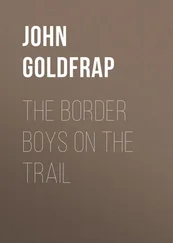I couldn’t answer.
With expressionless eyes, he looked long and hard at me. “I know you were following her all the way from Shibuya,” he said. “Follow someone that far, and they’re bound to catch on.”
I didn’t reply. She realized I was following her, went into this coffee shop, and called this man.
“If you don’t want to say anything, that’s okay. I know what’s going on without your having to tell me.” He may have been worked up, but you couldn’t tell from the polite, quiet way he spoke.
“There are several options here,” the man said. “I’m not joking. Whatever I feel like doing, believe me, I can do.”
Then he fell silent and continued to look at me. As if to give me the message that he didn’t need any explanation, since he had the situation under control. As before, I said not a word. “But I don’t want things to get out of hand. I don’t want to cause a scene. Understand me? This time only,” he said. He raised his right hand, which was lying on the table, reached into his overcoat pocket, and took out a white envelope. All the while, his left hand remained on the table. The envelope was nothing special, just a plain white business envelope. “Just take this, and don’t say a word. I know someone put you up to this, and I’d like to settle the whole matter amicably. Not a word about what’s happened. Nothing special happened to you today, and you never met me. Understand? If I ever do find out you’ve said anything, you can rest assured I will find you and take care of the matter. So I’d like you to forget about following her. Neither one of us wants any trouble. Correct?”
Saying this, the man laid the envelope in front of me and stood up. Snatching up the check, he paid the cashier and strode out of the coffee shop. I sat there dumbfounded. Finally I picked up the envelope on the table and looked inside. There were ten ten-thousand-yen bills. Crisp, new ten-thousand-yen bills. My mouth was parched. I shoved the envelope in my pocket and left the shop. I looked around, making sure that the man wasn’t there, then hailed a cab and went back to Shibuya, where this misadventure all began.
Years later, I still had that envelope with the money. Without ever opening it again, I stuck it in a drawer in my desk. On nights when I couldn’t sleep, I could see his face. Like an unlucky premonition of something, his face floated up clearly in my head. Who the hell was he anyway? And was that woman Shimamoto?
I came up with several theories. It was a puzzle without a solution. I would think of a hypothesis, only to shoot it down. The most convincing explanation was that this man was the woman’s lover, who thought I was a private eye hired by her husband to report on her activities. And the man thought his money would buy my silence. Maybe they thought I’d seen the two of them exiting a hotel where they’d had a rendezvous. It made sense. But even so, my gut feeling said no. Too many questions remained.
He said that if he wanted to, there were several things he could do to me, but what things did he mean? Why was he able to grab me in that unexpected way? If the woman knew I was following her, why didn’t she hail a cab? She could have shaken me in a minute. And why did that man, not knowing who I really was, toss me an envelope full of so much cash?
It persisted as a riddle. Sometimes I’d think it must have all been a delusion, from start to finish a fantasy I cooked up in my head. Or maybe a very long, realistic dream that somehow I’d mixed up with reality. But it did happen. Inside the drawer of my desk there was a white envelope with ten ten-thousand-yen bills inside, proof that it wasn’t a dream. It really happened . Sometimes I put the envelope on top of my desk and stared at it. It really did happen .
I got married when I was thirty. I met my wife one summer vacation while I was traveling alone. She was five years younger than me. I was walking along a road in the country, when all of a sudden it started raining. I ducked into the nearest place I could find to get out of the rain, and she and a girlfriend were already there. All three of us were soaked to the skin, and we soon fell into conversation while waiting for the rain to let up. If it hadn’t rained then, if I had taken an umbrella (which was entirely possible, since I seriously debated doing so before I left the hotel), I would never have met her. And if I hadn’t met her, I’d still be plugging away at the textbook company, still leaning against the wall in my apartment at night, alone, drinking, and babbling to myself. Makes me realize how limited our possibilities ever are.
Yukiko and I were attracted to each other from the start. Her friend was much prettier, but I had eyes for Yukiko only. An irrationally strong attraction pulled us together; I’d nearly forgotten what that kind of magnetism felt like. She lived in Tokyo too, so after our return we went out. The more I saw of her, the more I liked. She was, if anything, on the plain side, at least not the type to attract men wherever she went. But there was something in her face that was meant for me alone. Every time we met, I took a good long look at her. And I loved what I saw.
“Why are you staring at me?” she’d ask.
“‘Cause you’re pretty,” I’d reply.
“You’re the first one who’s ever said that.”
“I’m the only one who knows,” I’d tell her. “And believe me, I know.”
At first she didn’t believe me. But soon she did.
We’d always go to some quiet place and talk. I could tell her anything, up front, no holds barred. I could feel the weight of all I had lost those past ten years, all those years down the drain, bearing down on me. Before it was too late, I had to get some of it back. Holding Yukiko, I felt a nostalgic, long-gone thrill racing through me. When we said goodbye, I was lost once again. Loneliness pained me, silence had me exasperated. A week before my thirtieth birthday, after we’d been dating for three months, I proposed to her.
Her father was the president of a medium-size construction company, and a real character. He’d hardly been to school, yet was a go-getter—a bit too aggressive for my tastes. Still, I was impressed by his unique outlook on life. I’d never met anybody like him. He tooled around Tokyo in a chauffeur-driven Mercedes but never acted stuck-up. When I went to see him to ask for his daughter’s hand in marriage, he just said, “You’re not children anymore, so if you like each other it’s up to you.” I was not much of a catch, a nothing employee of a nothing company, but that didn’t faze him one bit.
Yukiko had an older brother and a younger sister. Her brother was vice president of the construction firm and was going to take over the family business. He wasn’t a bad sort but was overshadowed by his father. Of the three children, the younger sister, who was in college, was the most outgoing; she was used to getting her way. Come to think of it, she might have made a better president than her brother.
About half a year after I was married, Yukiko’s father asked me to come to see him. He’d heard from my wife that I wasn’t too thrilled working at a textbook company, and he wanted to know if I was planning to quit my job.
“I have no problem with quitting,” I said. “The problem is what I do after that.”
“How about coming to work for me?” he asked. “I’ll run you ragged, but the pay can’t be beat.”
“Well, I know I’m not cut out for editing textbooks, but I don’t think working in a construction firm’s my thing, either,” I said truthfully. “I appreciate the offer, but if I’m not suited for the work, the whole thing will end up being more bother than it’s worth.”
Читать дальше












